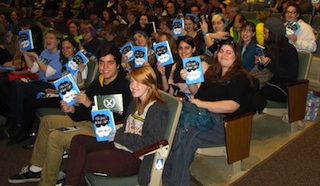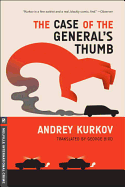 For the first time, the American Booksellers Association organized the Winter Institute attendees into working groups that concentrated on a case study of a fictional bookstore planning its future. Arranged into 22 groups with bookseller facilitators to lead the discussions, the teams took an hour and half Friday morning to brainstorm about everything from product mix to staff changes--and then presented the results to Dan Sheehan, Ingram's vice-president and general manager.
For the first time, the American Booksellers Association organized the Winter Institute attendees into working groups that concentrated on a case study of a fictional bookstore planning its future. Arranged into 22 groups with bookseller facilitators to lead the discussions, the teams took an hour and half Friday morning to brainstorm about everything from product mix to staff changes--and then presented the results to Dan Sheehan, Ingram's vice-president and general manager.
"Oren [Teicher, ABA's CEO] had to preform CPR on me within 15 minutes," said Sheehan as he began his report of the findings. "What I saw is that there was no one process in the 22 groups and everyone was going about it in a different way," said Sheehan.
"What a shock," came the response from the booksellers. "We are independent."
Still, Sheehan noted agreement about the top 10 topics that all the groups discussed: store layout, increasing children's books, refining product mix, optimizing leases, local community partnerships, effective use of co-op, payroll, events, location and store hours. Topics that did not come up at all or very little included: mission statement, digital books, e-commerce, print-on-demand, social media and closing the store. The last item brought applause. (Interestingly, the topics not discussed by the groups were all featured in WI7 sessions.)
Facilitators helped the groups conduct a SWOT analysis (focusing on the strengths, weaknesses, opportunities and threats involved in business decisions), which was a first for many booksellers. Sheehan noted that the groups reached a consensus on the three main ways to improve the store: by changing the layout, reevaluating product mix and increasing community outreach. And apparently most groups agreed that someone on staff named "Evil Evelyn" had to go. "We don't know what the heck that means, but it made the list," quipped Sheehan.
While the atmosphere was lighthearted, Sheehan said, the purpose of the working group exercise was serious: "to develop or enhance the personal relationships in this room and to learn from one another."
In that regard, most booksellers felt the exercise was a good use of time. As Chuck Robinson, co-owner of Village Books in Bellingham Wash., observed, "As in bookselling these days, the ABA isn't afraid of trying new things." In the months ahead ABA will analyze the group session feedback more scientifically.
Oren Teicher ended the Winter Institute's final session by encouraging attendees to reply in more detail about all the programs in the post-Wi7 survey they will soon receive. He thanked Ingram and all the sponsors, publishers who sent almost 70 authors to the three-day event, the ABA staff, and "most importantly, I thank each and everyone of you," he told the booksellers.
"We are leaving New Orleans with renewed energy and optimism about our future," said Teicher. "See you in Kansas City." --Bridget Kinsella
We'll have more coverage of Winter Institute sessions in the coming days.
 Yesterday, Amazon announced plans to open a one-million-square-foot fulfillment center next fall in South Carolina's Spartanburg County, officially confirming reports late last year that the online retailer was behind a code-named development initiative called "Project 300." The new facility will be the second warehouse in the state, joining the one in Lexington County, and involves a $50-million investment in the state, according to Amazon officials.
Yesterday, Amazon announced plans to open a one-million-square-foot fulfillment center next fall in South Carolina's Spartanburg County, officially confirming reports late last year that the online retailer was behind a code-named development initiative called "Project 300." The new facility will be the second warehouse in the state, joining the one in Lexington County, and involves a $50-million investment in the state, according to Amazon officials.











 Word Up, the pop-up bookstore in Washington Heights in New York City
Word Up, the pop-up bookstore in Washington Heights in New York City
 For the first time, the American Booksellers Association organized the Winter Institute attendees into working groups that concentrated on a case study of a fictional bookstore planning its future. Arranged into 22 groups with bookseller facilitators to lead the discussions, the teams took an hour and half Friday morning to brainstorm about everything from product mix to staff changes--and then presented the results to Dan Sheehan, Ingram's vice-president and general manager.
For the first time, the American Booksellers Association organized the Winter Institute attendees into working groups that concentrated on a case study of a fictional bookstore planning its future. Arranged into 22 groups with bookseller facilitators to lead the discussions, the teams took an hour and half Friday morning to brainstorm about everything from product mix to staff changes--and then presented the results to Dan Sheehan, Ingram's vice-president and general manager.

 It's 1997, and a retired general has risen up into the sky over Kiev, hanging by the neck from a huge Coca-Cola balloon. The corpse mysteriously vanishes from the forensics lab, only to reappear--missing the right thumb. Though the murder of this important government official warrants a full team of investigators, it's given to the tiny office of Major Ratko, and it's the first murder case ever assigned to young Viktor Slutsky, a mere lieutenant whose usual case load consists of petty street crimes. The narrative flips back and forth between Viktor and Nik Tsensky, a young interpreter trying to earn enough money for his wife and son to join him in Kiev. Nik is hired by a mysterious old colonel to rescue a man from an arranged fake attempt on his life--a man disconcertingly dressed just like Nik.
It's 1997, and a retired general has risen up into the sky over Kiev, hanging by the neck from a huge Coca-Cola balloon. The corpse mysteriously vanishes from the forensics lab, only to reappear--missing the right thumb. Though the murder of this important government official warrants a full team of investigators, it's given to the tiny office of Major Ratko, and it's the first murder case ever assigned to young Viktor Slutsky, a mere lieutenant whose usual case load consists of petty street crimes. The narrative flips back and forth between Viktor and Nik Tsensky, a young interpreter trying to earn enough money for his wife and son to join him in Kiev. Nik is hired by a mysterious old colonel to rescue a man from an arranged fake attempt on his life--a man disconcertingly dressed just like Nik.